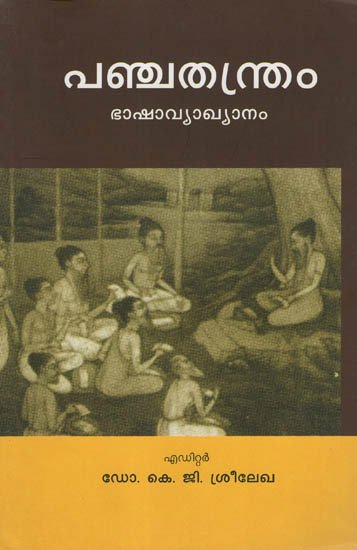Panchatantra [sanskrit]
by Dr. Naveen Kumar Jha | 2016 | 13,828 words | ISBN-13: 9788193077962
The Sanskrit edition of the Panchatantra referencing the English translation and grammatical analysis. Written by Vishnu Sharma and possibly dating as early as 1200 BCE, the Panchatantra (or Pancatantra) represents a collection of short stories teaching basic ethical values and moral conduct that was commonly practiced in ancient Indian. Alternative titles: Śrīviṣṇuśarman Pañcatantra (श्रीविष्णुशर्मन् पञ्चतन्त्र, Śrī-viṣṇuśarman pancatantra, श्री-विष्णुशर्मन्, Sri-visnusarman)
Verse 1.408
सामादि-दण्ड-पर्यन्तो नयः प्रोक्तः स्वयम्भुवा ।
तेषां दण्डस् तु पापीयांस् तं पश्चाद् विनियोजयेत् ॥ ४०८ ॥
sāmādi-daṇḍa-paryanto nayaḥ proktaḥ svayambhuvā |
teṣāṃ daṇḍas tu pāpīyāṃs taṃ paścād viniyojayet || 408 ||
The English translation of Panchatantra Verse 1.408 is contained in the book The Complete Pancatantra: Sanskrit Text with English Translation by Dr. Naveen Kumar Jha. This book is not available online so in order to read the full text and translation you should buy the book:
Buy now! English translation by Dr. Naveen Kumar Jha (2016)
Glossary of Sanskrit terms
Note: This extracts Sanskrit terms and links to English definitions from the glossary, based on an experimental segmentation of verse (1.408). Some terms could be superfluous while some might not be mentioned. Click on the word to show English definitions.
Sama, Saman, Danda, Paryanta, Naya, Prokta, Svayambhu, Svayambhuva, Tad, Papiya, Papiyas, Pashcat, Pashca,
Analysis of Sanskrit grammar
Note: this is an experimental feature and only shows the first possible analysis of the Sanskrit text (Panchatantra Verse 1.408). If the system was successful in segmenting the sentence, you will see of which words it is made up of, generally consisting of Nouns, Pronouns, Verbs, Participles and Indeclinables. Click on the link to show all possible derivations of the word.
- Line 1: “sāmādi-daṇḍa-paryanto nayaḥ proktaḥ svayambhuvā ”
- sāmā -
-
sāma (noun, masculine)[compound], [vocative single]sāma (noun, neuter)[compound], [vocative single]sāman (noun, neuter)[compound], [adverb], [nominative single], [vocative single], [accusative single]sāmā (noun, feminine)[nominative single]
- adi -
-
ad (noun, masculine)[locative single]ad (noun, neuter)[locative single]
- daṇḍa -
-
daṇḍa (noun, masculine)[compound], [vocative single]
- paryanto* -
-
paryanta (noun, masculine)[nominative single]
- nayaḥ -
-
naya (noun, masculine)[nominative single]ni (noun, masculine)[nominative plural], [vocative plural]ni (noun, feminine)[nominative plural], [vocative plural]
- proktaḥ -
-
prokta (noun, masculine)[nominative single]
- svayambhuvā -
-
svayambhū (noun, feminine)[instrumental single]svayambhuvā (noun, feminine)[nominative single]
- Line 2: “teṣāṃ daṇḍas tu pāpīyāṃs taṃ paścād viniyojayet ”
- teṣām -
-
tad (noun, neuter)[genitive plural]sa (noun, masculine)[genitive plural]
- daṇḍas -
-
daṇḍa (noun, masculine)[nominative single]
- tu -
-
tu (indeclinable particle)[indeclinable particle]
- pāpīyāṃs -
-
pāpīya (noun, masculine)[accusative plural]pāpīyas (noun, masculine)[nominative single]
- tam -
-
ta (noun, masculine)[adverb], [accusative single]ta (noun, neuter)[adverb], [nominative single], [accusative single]tā (noun, feminine)[adverb]tan (noun, masculine)[adverb]sa (noun, masculine)[accusative single]
- paścād -
-
paścāt (indeclinable)[indeclinable]paśca (noun, masculine)[adverb], [ablative single]paśca (noun, neuter)[adverb], [ablative single]
- vini -
-
vi (noun, neuter)[locative single]vī (noun, neuter)[locative single]vini (Preverb)[Preverb]
- yojayet -
-
√yuj (verb class 0)[optative active third single]
Other editions:
Also see the following editions of the Sanskrit text or (alternative) English translations of the Panchatantra Verse 1.408
Pancatantra of Visnusarman
by M. R. Kale (2015)
Panchatantra in Simple Sanskrit
by Dr. Vishwas (2016)
Panchatantram (Telugu)
by Tadanki Venkata Lakshmi Narasimha Rao (2020)
Published by J. P. Publications, Vijayawada; Throughout black & white Illustrations; 9788192053851.
Buy now!Preview of verse 1.408 in Telugu sript:
సామాది-దణ్డ-పర్యన్తో నయః ప్రోక్తః స్వయమ్భువా ।
తేషాం దణ్డస్ తు పాపీయాంస్ తం పశ్చాద్ వినియోజయేత్ ॥ ౪౦౮ ॥
Panchatantram Bhashavyakhyanam (Malayalam)
by Dr. K.G. Sreelekha (2010)
Published by the University of Kerala.
Buy now!Preview of verse 1.408 in Malayalam sript:
സാമാദി-ദണ്ഡ-പര്യന്തോ നയഃ പ്രോക്തഃ സ്വയമ്ഭുവാ ।
തേഷാം ദണ്ഡസ് തു പാപീയാംസ് തം പശ്ചാദ് വിനിയോജയേത് ॥ ൪൦൮ ॥
The Panchatantra Stories (Tamil)
by P. S. Aacharya (2017)
Published by Narmadha Pathippagam, Chennai.
Buy now!
Panchatantrer Galpa (Bengali)
by Children's Book Trust (2014)
Throughout color Illustration; 9788170112730
Buy now!Preview of verse 1.408 in Bengali sript:
সামাদি-দণ্ড-পর্যন্তো নযঃ প্রোক্তঃ স্বযম্ভুবা ।
তেষাং দণ্ডস্ তু পাপীযাংস্ তং পশ্চাদ্ বিনিযোজযেত্ ॥ ৪০৮ ॥
Panchatantra in Gujarati (Comic)
by Anant Pai (2013)
[શિયાળા અને રણશિંગ પંચતંત્ર] Published by Amar Chitra Katha; Throughout Color Illustrations; 9789350853115
Buy now!Preview of verse 1.408 in Gujarati sript:
સામાદિ-દણ્ડ-પર્યન્તો નયઃ પ્રોક્તઃ સ્વયમ્ભુવા ।
તેષાં દણ્ડસ્ તુ પાપીયાંસ્ તં પશ્ચાદ્ વિનિયોજયેત્ ॥ ૪૦૮ ॥
![Panchatantra [sanskrit] - book cover](/uploads/a/Pancatantra.jpg)






